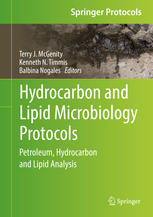

Most ebook files are in PDF format, so you can easily read them using various software such as Foxit Reader or directly on the Google Chrome browser.
Some ebook files are released by publishers in other formats such as .awz, .mobi, .epub, .fb2, etc. You may need to install specific software to read these formats on mobile/PC, such as Calibre.
Please read the tutorial at this link: https://ebookbell.com/faq
We offer FREE conversion to the popular formats you request; however, this may take some time. Therefore, right after payment, please email us, and we will try to provide the service as quickly as possible.
For some exceptional file formats or broken links (if any), please refrain from opening any disputes. Instead, email us first, and we will try to assist within a maximum of 6 hours.
EbookBell Team

4.0
36 reviewsThis Volume presents methods for analysing and quantifying petroleum, hydrocarbons and lipids, based on their chemical and physical properties as well as their biological effects. It features protocols for extracting hydrocarbons from solid matrices, water and air, and a dedicated chapter focusing on volatile organic compounds. Several approaches for separating and detecting diverse classes of hydrocarbons and lipids are described, including: (tandem) gas chromatography (GC) coupled with mass spectrometry (MS) or flame-ionisation detection, Fourier-transform induction-coupled-resonance MS, and fluorescence-based techniques. The book details high-performance liquid chromatography MS for microbial lipids, as well as a combination of techniques for naphthenic acids. Two chapters focus on quantifying bioavailable hydrocarbon fractions by using cyclodextrin sorbents and bacterial bioreporters, respectively, while a closing chapter explains how compound-specific stable-isotope analysis can be used to measure the fate of hydrocarbons in the environment.
Hydrocarbon and Lipid Microbiology Protocols
There are tens of thousands of structurally different hydrocarbons, hydrocarbon derivatives and lipids, and a wide array of these molecules are required for cells to function. The global hydrocarbon cycle, which is largely driven by microorganisms, has a major impact on our environment and climate. Microbes are responsible for cleaning up the environmental pollution caused by the exploitation of hydrocarbon reservoirs and will also be pivotal in reducing our reliance on fossil fuels by providing biofuels, plastics and industrial chemicals. Gaining an understanding of the relevant functions of the wide range of microbes that produce, consume and modify hydrocarbons and related compounds will be key to responding to these challenges. This comprehensive collection of current and emerging protocols will facilitate acquisition of this understanding and exploitation of useful activities